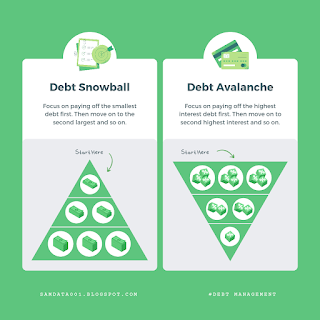Mastering the Art of Debt Management: Strategies for Overcoming Debt and Achieving Financial Freedom.
Although debt can be a significant source of stress and anxiety, you can gain control over your finances and find financial independence by managing your debt effectively. To manage your debt effectively, follow these steps:
Establish a budget:
Making a budget is the first step in managing debt. You can then find areas where you can cut back on spending by better understanding your income and costs. You can set priorities for your debt payments and designate a percentage of your income to go toward paying down your debts if you have a budget in place.
Sort your debts according to importance:
Not all debts are created equal. Debts with higher interest rates, such credit card debt, should take precedence over those with lower interest rates. Make a list of your debts and rank them according to interest rates, terms of payment, and other considerations.
Talk to your creditors:
Talk to your creditors about a negotiation if you're having trouble paying your debts on time. They might be ready to offer a debt settlement, a longer payment term, or a cheaper interest rate. Discuss your financial situation openly and honestly, and consider all of your possibilities.
Streamline your debt payments:
Streamline your debt payments by consolidating your loans, which may also result in lower interest rates. This entails getting a loan to pay off all of your debts, leaving you with just one monthly payment to make. To be sure, assess the benefits and drawbacks of debt consolidation as well as the associated costs and interest rates.
Avoid Additional Debt:
To effectively manage your debt, it's crucial to refrain from taking on additional debt. This entails being aware of your spending patterns and staying away from credit card debt with high interest rates and other debts that can be challenging to pay off.
Seek for Expert Assistance:
Consider obtaining expert assistance if you're finding it difficult to manage your debt on your own. A financial adviser or credit counselor can offer advice on how to raise your credit score, negotiate with creditors, and assist you in creating a debt management strategy.
In conclusion, discipline, persistence, and a sound plan are necessary for effective debt management. You can take charge of your finances and attain financial freedom by making a budget, setting priorities for your debts, prioritizing them, negotiating with creditors, consolidating them, avoiding taking on further debt, and getting help from a professional if necessary. Remember that managing debt requires patience, but with the correct plans in place, you can get out of debt and reach your financial objectives.

Comments
Post a Comment